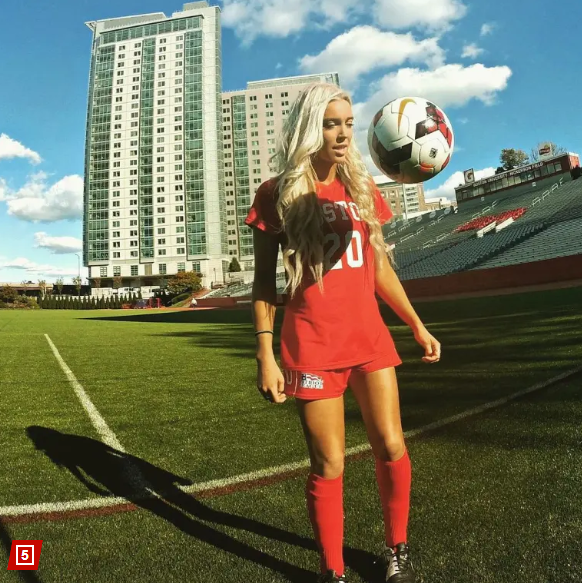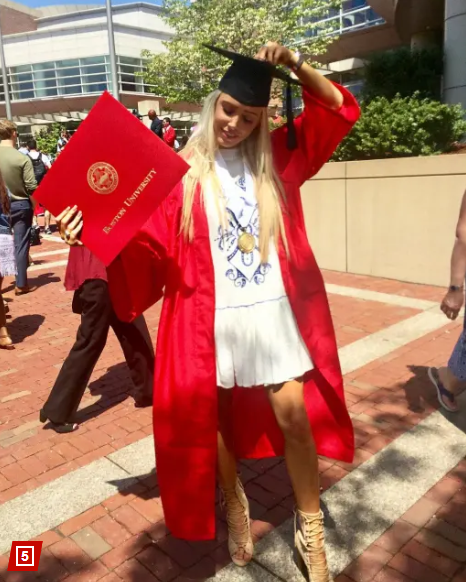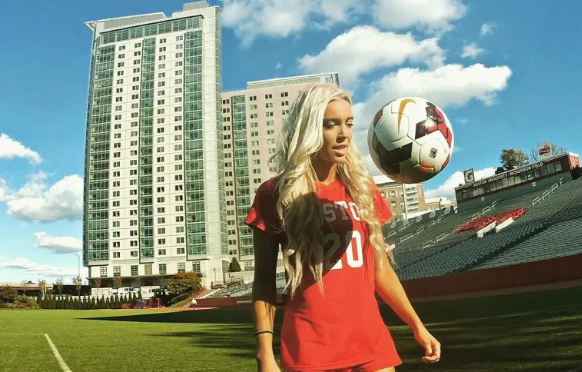
Boston University has once again found itself under scrutiny after a current women’s soccer player came forward with allegations of sexual harassment against an assistant coach—claims that have gained amplified attention following similar accusations made by popular podcast host Alex Cooper earlier this year. The university, already under pressure due to growing concerns over the handling of misconduct within its athletic department, is now facing calls for a comprehensive investigation and immediate accountability.
The unnamed soccer player, whose identity is being protected due to privacy concerns, submitted a formal complaint through the university’s Title IX office in early June. According to the complaint, the assistant coach made repeated inappropriate comments, sent unsolicited messages outside of training hours, and created what the player described as “an intimidating and sexually charged atmosphere” during team travel and practice.
The student-athlete detailed multiple encounters in which the coach allegedly crossed professional boundaries, including commenting on her appearance, making sexually suggestive jokes in front of teammates, and attempting to initiate one-on-one meetings without a clear athletic purpose. In one disturbing instance described in the complaint, the coach allegedly texted the player late at night, inviting her to his hotel room during an away game.

This report has reignited conversations about systemic issues in collegiate athletics, particularly regarding the power dynamics between male coaches and female athletes. For Boston University, the timing could not be worse. Earlier this year, Alex Cooper—an alumna of the university and host of the massively popular podcast Call Her Daddy—publicly revealed her own experience with inappropriate behavior by a former BU staff member. Though Cooper did not name her alleged harasser, her story opened the floodgates for others to share similar accounts of misconduct at the institution.
In a March 2025 podcast episode, Cooper emotionally described being “manipulated, targeted, and dismissed” during her time as a BU athlete and student. Her public platform brought significant attention to the issue, prompting a wave of online testimonials from former BU students, many of whom recounted similar experiences of harassment or institutional indifference.
With this latest accusation from a current student-athlete, pressure is mounting on Boston University to take swift and transparent action. Advocacy groups have begun circulating petitions demanding the immediate suspension of the accused coach, a third-party investigation into the athletic department’s culture, and greater support services for athletes who report misconduct.
The university issued a brief statement in response to media inquiries:
“Boston University is aware of the recent allegation involving a member of the women’s soccer coaching staff. The university takes all complaints of misconduct seriously and has initiated a Title IX investigation in accordance with our established procedures. We are committed to fostering a safe and respectful environment for all students.”
Critics argue that the university’s statement, while procedural, lacks urgency and compassion. “We’ve heard this kind of language before—‘we’re looking into it,’ ‘we take it seriously’—but what athletes need is action,” said Rachel Lin, a representative for Student Athletes for Justice, an advocacy group based in the Boston area. “Too often, schools prioritize protecting reputations over protecting students.”

Meanwhile, teammates of the accuser have shown public support. A joint Instagram post from several players on the women’s soccer team read: “We believe her. We support our teammate. No athlete should feel unsafe in their own locker room or under the supervision of a coach.”
This public solidarity marks a growing shift in the collegiate sports world, where female athletes are increasingly speaking out against abuse, harassment, and unequal treatment. The #WeBelieveHer hashtag has been trending among BU students and alumni, echoing a broader cultural movement around believing survivors and demanding reform.
Legal experts say that universities have a legal and ethical obligation to act quickly and fairly when faced with such allegations. Title IX, the federal civil rights law that prohibits sex-based discrimination in any school receiving federal funding, mandates that institutions respond promptly and equitably to complaints of sexual harassment.
“Failure to adequately investigate or protect students from retaliation could put Boston University at serious legal risk,” said Meredith Howell, a Title IX attorney based in New York. “But more than that, it would betray the trust of its student body.”
For Alex Cooper, the timing of this new allegation has brought a mix of sadness and validation. In a brief social media post reacting to the news, she wrote: “I came forward because I knew I wasn’t alone. My heart breaks for this player, but I’m proud of her for standing up. Change starts when we stop staying silent.”
As the investigation continues, all eyes are on BU’s administration. Will they deliver transparency and justice, or will this become another case in the long history of institutional neglect in college sports?
For the soccer player at the center of this story, speaking out was a terrifying but necessary decision. “I didn’t want to be next,” she reportedly told a friend, “and I didn’t want the girl after me to be either.”
Her courage is already inspiring a reckoning—one that may finally force Boston University to face the uncomfortable truths within its own ranks.



